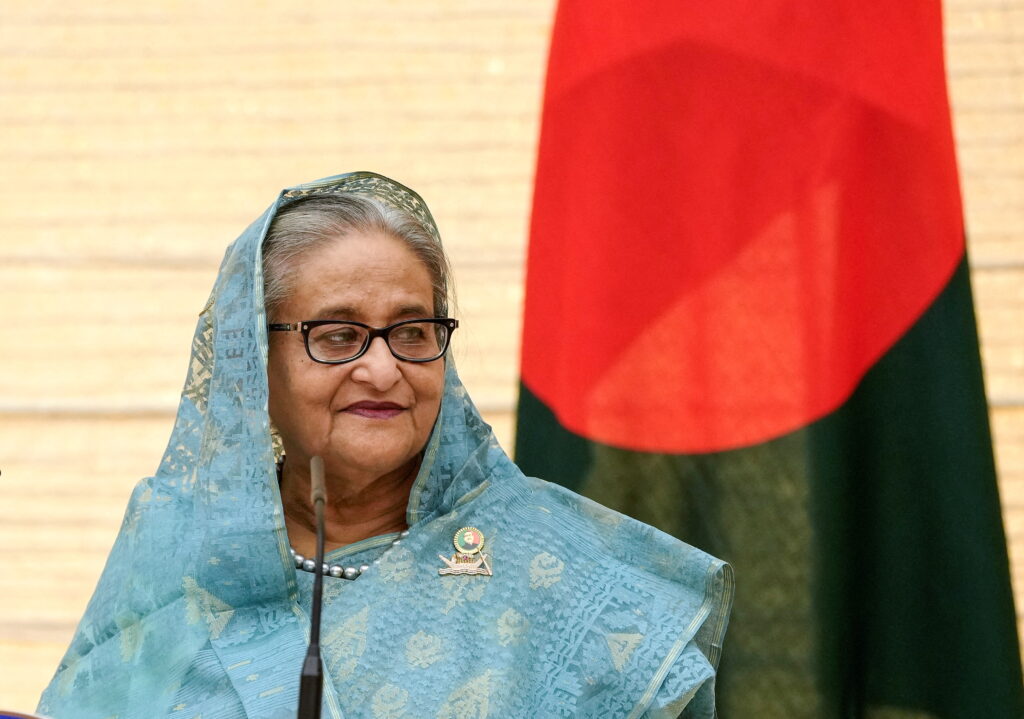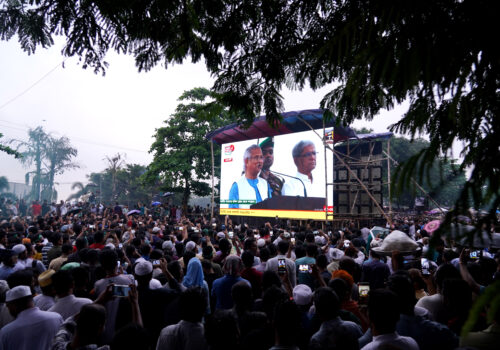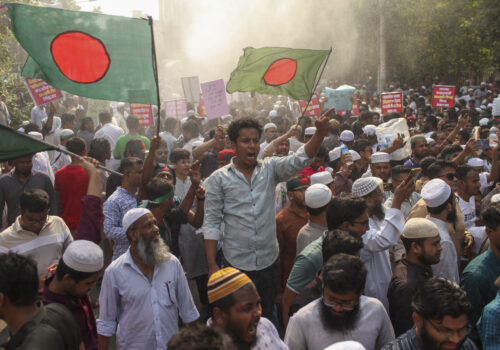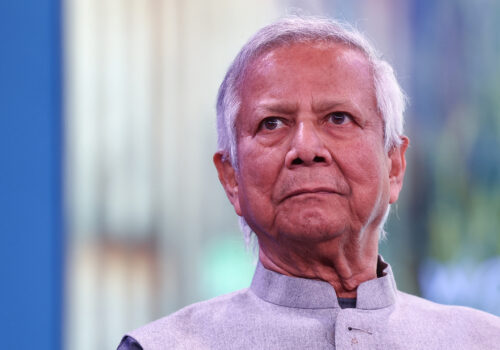On Monday, the International Crimes Tribunal based in Dhaka sentenced former Bangladeshi Prime Minister Sheikh Hasina to death for her role in the government’s deadly crackdown on student-led protests in July 2024. Having fled to India last year, Hasina was sentenced in absentia. So, what impact will the decision have on Bangladeshis’ efforts to turn the page on Hasina’s fifteen-year rule? Below, our experts share their verdict on the sentencing and what should follow it.
Click to jump to an expert analysis:
Rudabeh Shahid: Hasina’s death sentence will further polarize Bangladesh
Michael Kugelman: With Hasina in exile in India, New Delhi faces a tough choice
M. Osman Siddique: Bangladesh deserves stability, unity, and responsible leadership
Hasina’s death sentence will further polarize Bangladesh
Bangladesh’s International Crimes Tribunal sentencing Hasina to death marks a deeply polarizing moment in the country’s violent political trajectory. While the verdict focuses on her alleged responsibility for last July’s violent crackdown on student protesters, the impartiality of the International Crimes Tribunal itself has long been questioned, particularly because earlier decades of convictions disproportionately targeted Jamaat-e-Islami leaders under previous administrations. This history means the court’s decisions are inevitably filtered through layers of political memory and mistrust.
A powerful irony now shadows public reactions to the sentencing. A decade ago, thousands of Bangladeshi millennials gathered at Dhaka’s Shahbagh, dancing and chanting in support of death sentences handed down to Jamaat-e-Islami leaders. Today, many members of Bangladesh’s Gen Z are celebrating Hasina’s death sentence. These two moments are united by public demands for accountability, yet each reveals how dramatically the political tide can shift. It is important to note that many are celebrating not necessarily because they support capital punishment, but because they lost close friends during the July protests, a movement that toppled Hasina’s government and reshaped the national mood.
India is unlikely to extradite Hasina. New Delhi has already signaled reservations about due process and will almost certainly argue that the trial does not meet the standards required for a fair proceeding. This introduces a new tension into Bangladesh-India relations at a sensitive moment.
Domestically, the path to elections is far from straightforward. Holding national polls without the Awami League—the former ruling party under Hasina whose leaders have promised escalating resistance—risks producing a one-sided electoral landscape. With the Awami League effectively banned, the verdict may harden polarization rather than ease it.
Hasina’s death sentence has now split Bangladeshis into two camps: those who argue this is the only path toward accountability after years of authoritarianism, and those who insist that the death penalty undermines justice and that national reconciliation is essential.
Only time can tell which vision will define Bangladesh’s future. Nevertheless, if the country’s history is any guide, plot twists are guaranteed.
—Rudabeh Shahid is a nonresident senior fellow at the Atlantic Council’s South Asia Center and a visiting assistant professor of government at Wesleyan University.
With Hasina in exile in India, New Delhi faces a tough choice
This verdict puts India in a major bind. It will now face unprecedented pressure to extradite Hasina. However, Hasina is one of India’s closest friends; she and her family have long had close ties with the Indian ruling party and opposition alike, and New Delhi has no intention of betraying her. But if it continues to decline to turn Hasina over, India could squander an opportunity to patch up ties with the new administration that emerges from Bangladesh’s election, which is scheduled for next February. India has had many concerns about the changes in Bangladesh since Hasina’s ouster, including increased space for political and religious actors that are not fond of India. But it also has strong interests—from trade and connectivity to border security—that are best served with a friendly, or at least workable, relationship with Dhaka.
For New Delhi, the middle ground option is best: Work out an arrangement where Hasina can be relocated to a third country—likely an authoritarian state where her security would be ensured and access to her could be controlled. There’s been ample speculation since Hasina’s ouster about where she could end up, from Belarus to somewhere in the Gulf. But the question is if there will be any takers for such a high-maintenance charge.
Hasina may be a special guest of New Delhi’s, but she may now be wearing out her welcome—especially with India looking to explore opportunities for rapprochement with Dhaka as the Bangladesh election draws closer.
—Michael Kugelman is a South Asia analyst and the writer of Foreign Policy’s South Asia Brief.
A verdict meant to deliver justice, but the trial and aftermath raise difficult questions
The verdict against Hasina for crimes against humanity is an important moment for the family members of those who were killed during the protests that led to her ouster. For many, this is an acknowledgment of their grief and justice for their loss. Yet, the judicial process surrounding the trial also raised difficult questions. Several tribunal appointments have been criticized as politically motivated. The interim government amended the International Crime Tribunals Act of 1973 through administrative order to expand its scope and prosecute Hasina. The tribunal has also refused to appoint her legal representation. Amnesty International staunchly criticized the trial for its unprecedented speed, the fact that it was held in absentia, and concerns over its fairness that may complicate public trust in the outcome.
Hasina’s sentence makes her the first prime minister of Bangladesh to receive a capital conviction. Her political future remains uncertain: she remains exiled in India and any path home seems narrower. Yet she continues to command unwavering loyalty from her political party, the Awami League, and is likely to lead the party from India. India’s primary reaction, however, has been very cautious. New Delhi, thus far, has shown no intention to extradite Hasina; now the imposition of capital punishment in a trial conducted in absentia eliminates any realistic prospect that India will extradite her.
Inside Bangladesh, reactions to the verdict vary widely. Some groups that opposed the previous government view the decision as long overdue. Others worry that it may inflame an already polarized environment. The Awami League still holds a sizable, loyal base of supporters. Episodes of political violence resurfaced in the days preceding the verdict, which suggests that tensions could escalate rather than ease. With the parliamentary election only three months away, and the Awami League barred from the election, the risk of renewed unrest is difficult to dismiss.
—Wahiduzzaman Noor is a Bangladeshi national security professional and former diplomat at the Embassy of Bangladesh in Washington, DC, with expertise in South Asian affairs, Indo-Pacific security, and counterterrorism.
Bangladesh deserves stability, unity, and responsible leadership
The verdict concerning Hasina is a very significant development. My hope is that Bangladesh navigates this with restraint, respect for the rule of law, and a commitment to national harmony.
It is absolutely essential that the legal process remain transparent and that peace and security are maintained for all citizens.
Whatever the prevalent political views are, justice must be fair, and society must remain peaceful. Bangladesh deserves stability, unity, and responsible leadership from all sides during this moment.
—M. Osman Siddique is a nonresident senior fellow at the Atlantic Council’s South Asia Center. He previously served as the US ambassador to the Republic of Fiji with concurrent accreditations to the Kingdom of Tonga, the Republic of Nauru, and the government of Tuvalu from 1999 to 2001.
Further reading
Wed, Aug 13, 2025
What Bangladesh has achieved in the year since its revolution
New Atlanticist By
A year ago, Prime Minister Sheikh Hasina fled Bangladesh. Amid many changes since then, the country continues to work its way forward.
Mon, Aug 4, 2025
Bangladesh’s revolution is at a crossroads. Open elections are the best way forward.
New Atlanticist By
The promising uprising last year now risks becoming a system in which power, not principles, determines who gets to participate in democracy.
Fri, May 23, 2025
Bangladesh may have ended its India-China tightrope game, but it must continue to tread carefully
New Atlanticist By
With Bangladesh outgrowing its small-power past, the stakes of the country's geopolitical choices have never been higher.
Image: Bangladesh Prime Minister Sheikh Hasina attends a joint press remarks with Japanese counterpart Fumio Kishida (not pictured), at the latter's official residence in Tokyo, Japan, 26 April 2023. KIMIMASA MAYAMA/Pool via REUTERS




